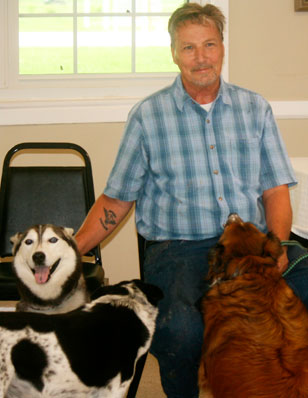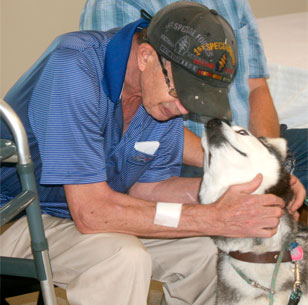INSERTS IN PRINT EDITION
• American Profile
• IGA Market
Visit our advertiser's website by
clicking on their ad!

June 17, 2014 • Headlines
|
|
 |
||
|
|
|||
|
|
The 2014 JCD Eagle athletic spring sports staff . Read JCD athletic staff names in the Osgood Journal print or e-Edition. GARY FRANKLIN PHOTO |
|
|
|
|
|||
 |
||
|
|
||
|
|
Curbs were being installed along US 421 in the town of Osgood Friday afternoon. The town contracted an excavating company to do the work. The concrete work should be finished by the end of summer. MARY MATTINGLY PHOTO |
|
|
|
||
 |
||
|
|
||
|
|
Candidates for the 2014 Ripley County Fair Queen gathered Friday at the Osgood Town Hall to learn about the pageant information and meet one another during an overnight stay. Read the Osgood Journal print or e-Edition to learn the names of this year's candidates. MARY MATTINGLY PHOTO |
|
|
|
||
Dogs make for good medicine
Mary Mattingly
EDITOR
mmattingly@ripleynews.com
David Fleming may be the Silver Memories nursing home residents’ best friend. That might be because every Tuesday and Thursday he brings four of man’s best friends to visit the 17 residents.

MARY MATTINGLY PHOTO
David Fleming is pictured with Bear, Angel and Odie at Silver Memories.
Gus, Bear, Odie, and Annie can’t wait to interact and mingle with the nursing home residents on US 421, five miles south of Versailles.
The retired Holton truck driver says as soon as he tells his four-legged friends, “We’re going to visit our friends,” the dogs race for the vehicle, “Annie practically drags me.” See, Dave Fleming loves dogs and people. So why not bring the two together for mutual benefit? They, as in the residents, absolutely love it; so does the staff
“They all look forward to Tuesdays and Thursdays. It lifts their spirits,” says Cindy Rogier, director of nursing. If a resident can’t join them in the community room, the dogs will go to their room upon request. “Gus (two-year-old Lab) will jump in bed with the resident,” she said. “It’s just so nice.”
“I love dogs, and I had them all my life,” says resident Alvin Woliung, petting Annie, an affectionate Husky. “They just kiss the daylights out of me!”
Velma Day misses the Chihuahua she had at home, but these creatures comfort her. She feeds the dogs cookies from her hand. Resident Gayla Blust pets Annie, “Annie is my girl. She is so pretty. I always wanted to see a Husky. It was on my bucket list and now I got Annie,” the former Dillsboro resident said.
Pet or animal-assisted therapy can not only put a smile on a patient’s face, but improve their health. The Mayo Clinic reports pet therapy can reduce pain, anxiety, depression, and fatigue among people with a range of health problems. It’s been known to lower blood pressure, releases endorphins and improves cardiovascular health. The act of petting actually produces an automatic relaxation response reducing anxiety.
Fleming, a decorated Vietnam veteran, has been bringing the friendly dogs to the nursing home since November. He got the idea when he got approval to bring his 92-year-old father’s dog to his nursing home in Indianapolis, and the residents loved seeing his best friend. Why not help his fellow county residents, Fleming thought. The Silver Memories owners gave him approval to do so, and all 17 residents enjoy the weekly experience. No one has ever complained, and the one resident who was afraid of dogs, actually warmed up to these, according to Rogier. All of the dogs are rescue dogs. Fleming has trained them as well. Cats and dogs are often dropped off at the Fleming homestead and farm. His daughter brought him Bear, a Sheltie, and it was love at first sight, he said. “I wouldn’t take a million dollars for them,” he said. He also brings three of his five cats to visit at the nursing home.

MARY MATTINGLY PHOTO
Pictured right, Annie, a Husky, is affectionate with Paul Roberts and the other residents. Annie likes to get her fur vacuumed!
It’s not just the animal visits, but the staff will tell you Fleming also brings fried chicken on Fridays to the residents. Herman, a former Cummins Engine plant manager and now a resident, really enjoys the catered meal. And, on this sunny morning, Fleming planted rose bushes out front with resident Paul, a Vietnam veteran who was in the same company with him, while the dogs met with their two legged friends. He also takes Paul to church with him on Sundays. Paul had a stroke several months ago. Fleming’s simple act of kindness and time earns Fleming unwanted praise. The staff and residents call him a hero, an angel, a great guy. Resident Alvin Woliung puts it best. “I think Dave is a gift from God!” Rogier adds, “He is a hero. He does so much for these people.”
The humble Fleming is embarrassed by the attention. (A person tipped us at the newspaper and warned that Fleming would not seek any recognition.) It’s not about him but about helping others who don’t feel so good and giving them a little joy. Yet, he acknowledges his wife has said that perhaps if someone else becomes aware of how rewarding this small act can be, they will get the idea and do something similar for folks in need.
As he says, “I’m just a regular guy who loves dogs and people!” Maybe so. But the two turn out to make for great medicine.
Outdoor risks
Take precautions for mosquitoes, sunburn, heat
Cathy May
CONTRIBUTING WRITER
clippmay@comcast.net
Dr. David Welsh, Ripley County’s Health Officer, said that one way to keep yourself safe this summer is to wear a hat with a brim. Summer means bathing suits, barbecues and enjoying the great outdoors. It also means an increased risk of unpleasant and, in some cases, potentially fatal illness.
Sunburn
Prevent sunburn by using sunscreens with titanium dioxide and zinc oxide, which are physical barrier type sun screens that protect you from both UVA and UVB rays. Other options for avoiding sunburn include wearing protective gear such as sun hats and clothing that cover the majority of your skin without being restrictive or causing you to be too hot. Avoid the sun at midday (10 a.m. – 2 p.m.), when the sun is at it’s hottest. Welsh also warned that too much exposure to the sun when you’re young can lead to more serious skin problems later on such as skin cancer.
Heat Illness
Heat illness is common among athletes, children and older adults. Signs of heat exhaustion include weakness, fatigue, nausea, headache, clammy and moist skin, and profuse sweating with normal to slightly elevated body temperatures. Signs of a heat stroke include mental confusion, delirium, loss of consciousness, convulsions, lack of sweating, and hot and dry skin with increasing body temperature. To prevent heat illness, break up your physical activity with rest or at least take time to be in the shade. Ease in to outdoor activities. Be smart. Do not wait until the hottest day of the year to decide you are going to start jogging again after a five-year hiatus. Do heavy physical activity before 10 a.m. or after 2 p.m. Wear clothing that allows your body to breathe. Light colors are optimal as darker shades attract and trap the heat. And, above all, don’t push yourself.
Dehydration
Dehydration is a condition that occurs when the loss of body fluids, mostly water, exceeds the amount taken in. Prevent dehydration by consuming plenty of pure water. In extreme cases, those who are dehydrated will experience weakness, dizziness, palpitations, confusion, sluggishness, fainting, and the inability to sweat. If you will be out in hot weather doing strenuous activity, prepare by being well hydrated in advance. Bring water with you and drink often; one quart an hour is advised. Avoid drinking alcohol, as it is a diuretic and impedes your ability to accurately judge your level of dehydration. Dr. Welsh also said that caffeine drinks don’t count. Take frequent breaks indoors in air conditioning or at least find a shady place to rest and re hydrate.
Mosquitoes are the deadliest animals on Earth. That’s right, more deaths are associated with mosquitoes than any other animal on the planet. Mosquitoes may carry any number of deadly diseases including malaria, dengue fever, yellow fever, and encephalitis. Mosquitoes also carry heartworm, which can be lethal to your dog. Just a few inches of water is all it takes for a female to deposit her eggs. Tiny mosquito larva develop quickly in bird baths, roof gutters and old tires. If you want to keep mosquitoes under control around your home, you need to be vigilant about dumping any standing water every few days. Other breeding areas are children’s wading pools, flower pots and fire pits. Empty any water from them several times a week. You can take a number of steps to limit your exposure to mosquitoes and protect yourself from bites when mosquitoes are unavoidable. Use insect repellent. Most insect repellent products applied to the skin contain one of three active ingredients: DEET, Picaridin (also called KBR 3023), and oil of lemon eucalyptus (a plant-based compound). These repellents temporarily keep hungry mosquitoes from identifying you as a food source. The higher the concentration of DEET, the longer its protection will last. Apply repellent only to exposed areas of skin and not under clothing. When you go indoors, wash with soap and water to remove any remaining repellent. Permethrin is an insecticide and insect repellent recommended for use on clothing and outdoor equipment. You apply a permethrin product directly to the clothes and fabric-covered equipment you want to protect. Some sporting goods stores sell clothing pretreated with permethrin.
Wear protective clothing
When you’re in an area with lots of mosquitoes, wear long sleeves, socks, long pants possibly tucked into the tops of your socks, light colors, and wide-brimmed hats to help protect your ears and the back of your neck. So, as Welsh said, “Enjoy your summer, but take precautions to keep yourself safe.” And, buy yourself a hat!
Information for this article was garnered from various health websites including webMD and the Mayo Clinic.
 |
 |
|













